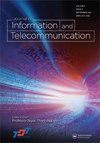Development of internet measurement principles for representation of measured provision of service (QoS-2)
IF 1.7
Q2 COMPUTER SCIENCE, INFORMATION SYSTEMS
Journal of Information and Telecommunication
Pub Date : 2020-12-02
DOI:10.1080/24751839.2020.1847490
引用次数: 2
Abstract
ABSTRACT In modern world, technology plays a significant role. Upcoming services, demanding a specific level of service quality that should be guaranteed no matter what, will impose obligations to network performance and capacity. European strategy for broadband development prescribes a set of quality indicators that networks should correspond. But imposed obligations themselves don’t guarantee the persistent level of quality. European initiatives of geographical mapping of broadband access, which are developed in order to monitor the development of internet access services, propose guidance for gathering and representation of estimated QoS parameters at the so-called QoS-1 level, whereas monitoring of actual network performance on QoS-2 level and representation of real and objective internet quality indicators rests undefined. Besides ensuring that quality is described in meaningful and comparable manner the general measurement methodology that suits various purposes should be established. This research is aimed to develop principles of monitoring and objective representation of internet access service quality parameters in specific location on QoS-2 level, as well as to establish joint mechanism to obtain the quality of service data that would be appropriate for different needs. This research is directed to the mobile internet access service.为表示已测量的服务提供而制定互联网测量原则(QoS-2)
在现代社会,科技扮演着重要的角色。即将到来的服务,无论如何都需要保证特定的服务质量水平,这将对网络性能和容量施加义务。欧洲宽带发展战略规定了一套网络应符合的质量指标。但强加的义务本身并不能保证持续的质量水平。欧洲的宽带接入地理制图倡议是为了监测互联网接入服务的发展而制定的,它提出了在所谓的QoS-1级别收集和表示估计的QoS参数的指导,而在QoS-2级别监测实际网络性能和表示真实和客观的互联网质量指标尚未定义。除了确保以有意义和可比较的方式描述质量外,还应建立适合各种目的的通用测量方法。本研究旨在建立QoS-2层面特定地点互联网接入服务质量参数的监测和客观表征原则,并建立联合机制以获取适合不同需求的服务质量数据。本研究针对移动互联网接入服务。
本文章由计算机程序翻译,如有差异,请以英文原文为准。
求助全文
约1分钟内获得全文
求助全文
来源期刊
CiteScore
7.50
自引率
0.00%
发文量
18
审稿时长
27 weeks

 求助内容:
求助内容: 应助结果提醒方式:
应助结果提醒方式:


